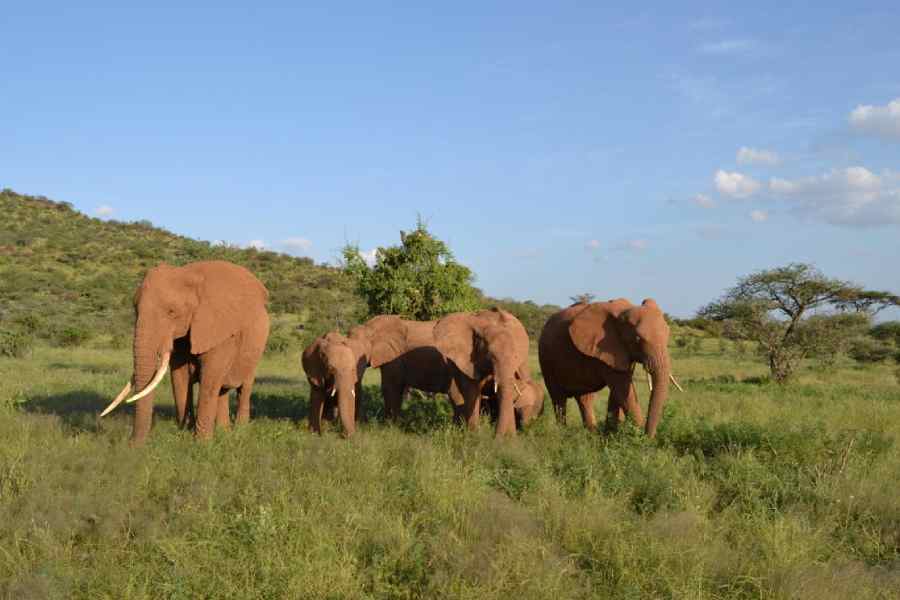Wild elephants address one another with specific name-like calls, researchers said on Monday in a study that has suggested that elephants too engage in a phenomenon hitherto known to occur only in human language.
The researchers who conducted field investigations of wild elephant herds in Kenya and analysed audio recordings of their calls have found that elephant calls contain a name-like component that identifies the intended recipient elephant.
In field tests, when the researchers played back samples of recorded calls, the elephants responded to calls directed to them by enthusiastically moving towards the speakers and calling back. But calls intended for other elephants did not evoke such responses, indicating that they "recognised" their names.
"This tells us something about how sophisticated and intelligent elephants are," said Michael Pardo, an animal behaviour scientist at Cornell University and the lead author of the study published on Monday in the journal Nature Ecology and Evolution.
Many species across the animal kingdom produce specific sounds or calls for food or predators, but the production of the calls is innate or pre-programmed in the brain. Only dolphins and parrots have been known to address others of their own species by imitating calls of the addressee.
The new study has suggested that elephants do not rely on imitations of the receiver’s calls but address them through name-like calls acquired or learned through a process called vocal production learning, a precursor to language.
Vocal production learning is the ability to learn to produce vocalisations based on auditory experience in contrast to the vocalisations preprogrammed in the brain.
Pardo said it is unclear how elephants acquire specific names. One hypothesis is that elephants get their names from their mother or other caregivers.
“We have observed mothers calling repeatedly to their newborn shortly after birth, and we wonder if this might be how the newborn get their names,” Pardo told The Telegraph. “In support of this view, our analysis suggested that the type of calls that mothers make to their calves were especially likely to contain names — more so than the close-distance calls that elephants make to adults.”
Joyce Poole, a research collaborator and scientific director of ElephantVoices, a research organisation engaged in the study of elephant cognition, communication and behaviour said observations suggest that names are given in the first hours or days of life.
The researchers spent 14 months in the field, following elephants in a vehicle and recording their calls. They captured 470 distinct calls from 101 unique caller elephants and intended for 117 unique receiver elephants.
The researchers said their discovery of individual name-like labels in elephants — a species that diverged from primate lineages over 90 million years ago — may be rooted in the social behaviour and ecology of elephants.
Elephants maintain lifelong and distinct social bonds with many individuals and their social dynamics often lead to situations where elephants are separated from their closely bonded social partners.
Poole said: “Being very social animals who live in groups and families that often split and rejoin, they needed to be able to create names for one another in order to stay in touch with specific individuals over long distances.”
"This is something extraordinary," said Anindita Bhadra, an animal behaviour expert at the Indian Institute of Science Education and Research, Calcutta, who was not associated with the study.
"Identities for individuals would be expected in social animals, but this is evidence for linguistic identity ... if elephants indeed have names for each other, this would open up a whole new paradigm for language research," Bhadra said.
George Wittemyer, a research collaborator and professor at the Colorado State University's Warner College of Natural Resources, said the use of arbitrary vocal name-like labels indicates that elephants may be capable of abstract thought.
The scientists say they will need more data to isolate the names within the calls and determine whether elephants also have names for other things they interact with such as food or water.
Pardo said the findings should "make us seriously reconsider the ethics of keeping elephants in captivity and exploiting them for human benefit, especially amid strong evidence that they suffer immensely when kept in small spaces and are not allowed normal social interactions as in the wild.










